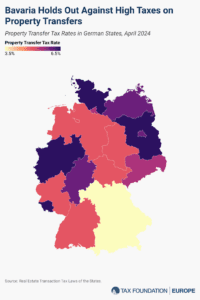
How Controlled Foreign Corporation Rules Look Around the World: Germany
6 min readBy: ,Germany has had a Controlled Foreign Corporation (CFC) regime since 1972, when the German Foreign Transactions TaxA tax is a mandatory payment or charge collected by local, state, and national governments from individuals or businesses to cover the costs of general government services, goods, and activities. Act was enacted. Under the German regime, a CFC is a foreign company where its capital or voting rights are either directly or indirectly majority-owned by German residents at the end of its fiscal year. (The rules apply even when there is a partnership in the chain of companies.)
In a recent development the German Federal Tax Court limited the application of the rules to wholly artificial arrangements, in a way following the decision of the Court of Justice of the European Union in the Cadbury Schweppes case. Cadbury Schweppes was a case in England where the tax authority tried to tax CFC income from a subsidiary doing mostly finance. The EU Court considered that there were business activities in the subsidiaries and the freedom of establishment principle should prevail. The result was that the UK tax authority was not allowed to tax the CFC income.
Shareholding requirement for the control determination in Germany
Under the German CFC regime, the control threshold for CFC purposes is 50 percent. The German regime also has a jurisdictional approach that combines the ownership threshold with a low tax threshold to determine if a company can be considered a CFC. The share of ownership of all German residents is added to determine ownership; if the sum is more than 50 percent, the rule is applied.
Differently from what happens in other countries, under the German legislation any shareholder with 1 percent or less of participation in a CFC can be attributed taxable incomeTaxable income is the amount of income subject to tax, after deductions and exemptions. For both individuals and corporations, taxable income differs from—and is less than—gross income. . In the case of the U.S. a person needs to hold at least a 10 percent participation in the CFC to be considered a U.S. shareholder and be taxed on its CFC income.
Applicability of the rules
Another part of the determination is the comparison of the rate applied to the CFC in the country where it is domiciled and the taxes that the CFC would have paid on that income in Germany. For this purpose, to calculate if a foreign subsidiary has been subject to a lower rate, the effective rate is calculated as a ratio of the taxes levied in the residence country on the passive income of the CFC and the tax baseThe tax base is the total amount of income, property, assets, consumption, transactions, or other economic activity subject to taxation by a tax authority. A narrow tax base is non-neutral and inefficient. A broad tax base reduces tax administration costs and allows more revenue to be raised at lower rates. of the CFC determined under German tax law. The CFC is treated as a German company to calculate the ratio; if the foreign tax charge is less than 25 percent of the German charge, the rule is applied. All the requirements must be met simultaneously.
Once CFC income is determined, the amount is added to the taxable income of the German shareholder. Taxes paid by the CFC are creditable to the German corporate shareholder only when they are not refundable. Losses generated by a CFC cannot be attributed to the German shareholders but can be carried forward to offset future income of the CFC.
To understand how this works, imagine that a German citizen is an investor overseas and his main activity is counseling people on investing abroad. The German also sometimes invests in German companies. From the CFC perspective, a company where that German has invested and holds 6 percent of the total shares is considered a CFC. The corresponding part of income from that company is taxable in Germany, and it would be added to the German citizen’s taxable income from his advisory activities.
Taxes paid on the attributed CFC income to a shareholder or on the property underlying the attributed income are deductible from the attributed income or may be credited against the German tax (corporate or income tax) charged in the same tax year.
Dividends actually paid by a CFC are exempt to their German shareholders under the participation exemption. The rule is applicable for corporations without exception. In the case of noncorporate shareholders, dividends are exempt only if distributed within a period of seven years from when the CFC income was attributed to the shareholder. If shares of the CFC are sold, capital gains derived from the sale are exempt subject to the same conditions as dividends including the seven-year rule period.
Imagine that the company the German citizen invested in decides in a determined period to distribute dividends. They then will receive 6 percent of the corresponding dividend for their participation in the company and probably would be protected by the participation exemption. That means that the distribution results in the CFC not being taxed on those dividends in Germany.
What is the type of income that is taxable: all income or just passive income?
The rules apply if the company generates passive income, and its income is taxed below the 25 percent threshold. German law differentiates between passive and active income (there is a list of what qualifies as active income). Examples of active income are agricultural and forestry income, banking and insurance (unless captive), profits distributions, and income from trading activities. Under German rules the taxpayer rather than the tax administration carries the burden of proof to demonstrate if the income received is active or passive income.
German tax law also has a de minimis rule that exempts low-taxed passive income if it does not exceed 10 percent of the overall income of the CFC, and neither the gross incomeFor individuals, gross income is the total pre-tax earnings from wages, tips, investments, interest, and other forms of income and is also referred to as “gross pay.” For businesses, gross income is total revenue minus cost of goods sold and is also known as “gross profit” or “gross margin.” of the CFC nor the German shareholder exceeds EUR 80,000 during the tax year.
If the CFC is based inside the EU or the European Economic Area, and the taxpayer can prove to the authorities that the company pursues real economic activities, then income from the CFC cannot be attributed to the German shareholder.
Additional comments on the German regime
A 2018 report from Deutsche Bank explains that CFC taxation is particularly restrictive in Germany. German CFC rules are outdated and are designed to ensure that a certain portion of the foreign income is adequately taxed. According to the report, the German tax rules put non-German subsidiaries of German parent companies in other countries at a disadvantage. The report argues that the definition of low-tax rate is too high with a 25 percent rate threshold triggering the application of the rules.
This may be part of the reason why France and Germany are currently converging on the creation of a minimum tax proposal at the OECD.
Conclusion
The German system may need some adjustments to align its standards to what the EU ordered to be incorporated based on the Anti-Tax Avoidance Directive. If that does not happen soon, then the cases where the German assessments on CFC income would be challenged in the EU Court will increase, and the application of new rules will come to the country not from the legislative perspective but from case law. The authorities in the country may need to find a competitive solution to update the rules and help German multinationals to succeed in the EU single market.
Note: This is one of nine posts which describe how CFC rules work in the United States, China, Spain, Germany, Colombia, France, Netherlands, Japan, and the United Kingdom. A longer discussion of the history of CFC rules and more details on these countries can be found here.
Stay informed on the tax policies impacting you.
Subscribe to get insights from our trusted experts delivered straight to your inbox.
Subscribe
